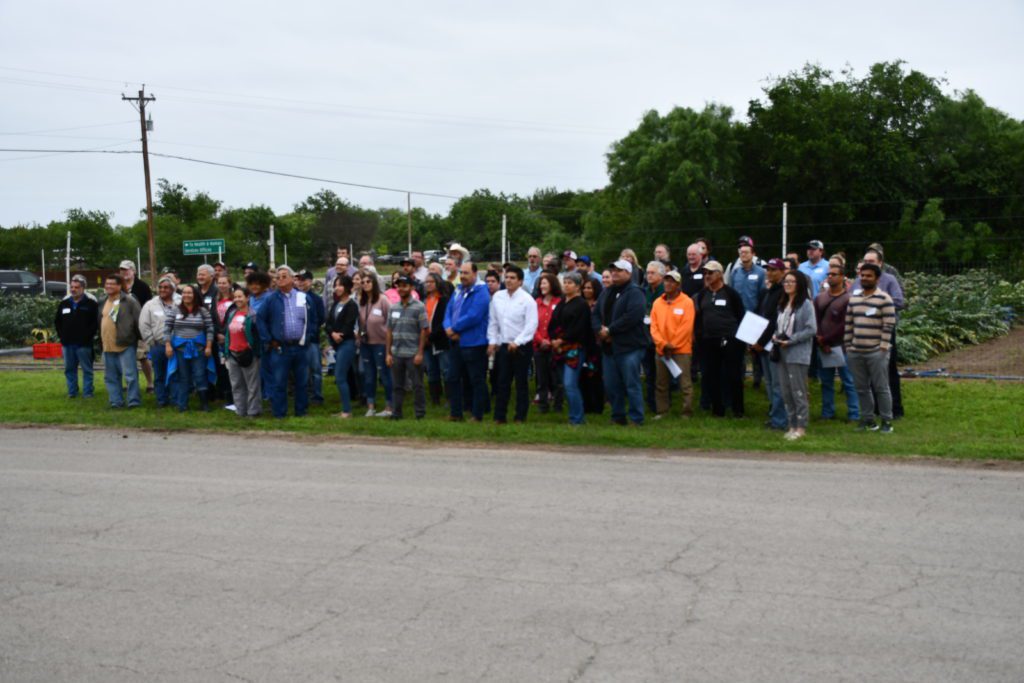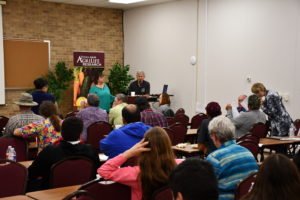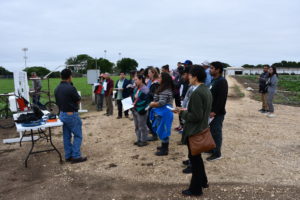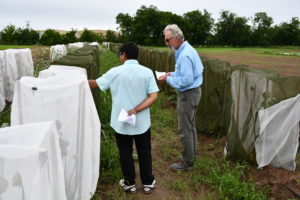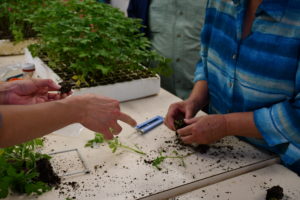May 23, 2019Vegetable, wheat field day at Texas A&M draws producer interest
More than 70 agricultural producers, gardeners and others attended the recent Vegetable and Wheat Spring Field Day at the Texas A&M AgriLife Research and Extension Center in Uvalde, Texas.
The free event was open to area producers and the public, with lunch provided courtesy of First State Bank of Uvalde.
There were presentations by vegetable and wheat experts, along with a tour of test plots on the center’s grounds. Attendees visited several different locations at the center’s farm to get a close-up look at a variety of research being conducted at the center.
Among the topics covered were production techniques in a controlled environment and open field, crop development, soil amendments and soil health, along with sharing data and findings on melons, watermelons, artichokes, onions, tomatoes, olives and winter wheat.
Texas A&M AgriLife center director Dr. Daniel Leskovar addresses field day attendees in the facility’s auditorium.
“We wanted to introduce producers and others attending to the research we’ve been doing on these crops and show them how this research and certain techniques can be applied to improve their own agricultural operations,” said Dr. Daniel Leskovar, center director.
Leskovar said the major goal of the field day was to give producers insights on increasing profitability through improved crop management with genetically improved varieties.
These would require fewer inputs such as water and nutrients, have good yields and produce a quality product with characteristics consumers find desirable,” he noted.
Dr. Xuejun Dong dicusses irrigation, evapotranspiration and root development with field day attendees.
Specific coverage of production included vegetable breeding for disease and insect resistance; nitrogen-use efficiency; field, organic and hydroponic production; the use of sensors and ground-penetrating radar to determine soil moisture and root development; testing phenotypes to determine best-suited crops; chemical inputs to improve quality and yield; and tomato grafting for high–tunnel production.
Before visiting outdoor sites, attendees heard from Dante Galeazzi, CEO and president of the Texas International Produce Association, Mission, who spoke about fresh produce sales and markets. They also heard from Dr. Alejandro Castillo, associate professor in Texas A&M University’s College of Agriculture and Life Sciences, College Station, who presented on current issues in produce safety.
Tim Miller, owner of Millberg Farm in Kyle, was one of the field day attendees.
Tim Miller, owner of Millberg Farm in Kyle, right, hears about at research being done on whiteflies at the Uvalde center.
“I am a small-production organic farmer specializing in heirloom alliums like leeks, garlic and onions,” Miller said. “I came to the field day to see what organic techniques are being studied and what specialized information I might get from these experts to help me be a better farmer. I’m also interested in polyculture, so I wanted to find out more about the work they’re doing with hydroponic production.”
Derrick Emadi, owner of Emadi Acres Farm in Lockhart, a small-scale market gardening operation, was another attendee.
“I came to learn more about breeding vegetables for pest and disease tolerance,” he said. “I’m also thinking about doing more indoor gardening, so was interested in finding out more about greenhouse and high-tunnel construction and production.”
About 30 attendees participated in the hands-on tomato grafting workshop offered at the end of field day activities.
An area of particular interest to about 30 attendees was the tomato grafting workshop offered at the end of the program. The workshop included a primer on the benefits of grafting and how grafting tomato varieties onto more resistant rootstocks can help manage soil-borne pathogens as well as enhance growth and yield. There was also a hands-on demonstration in which participants were shown the proper method of grafting and then allowed to try it for themselves.
For an AgriLife Extension video on tomato grafting, go to https://www.youtube.com/watch?v=7dSh2ulvcAk.
“This tomato grafting process to obtain a grafted plant can be a great benefit to area producers in helping them breed and combine the types of tomato plants that perform well in this area and have characteristics that will appeal to consumers,” Leskovar said.
He noted the hands-on grafting workshop, as well as the research and field testing done at the center, are for the purpose of giving producers “science-based and real-world-tested ways to do things better with fewer or less expensive inputs.”
– Paul Schattenberg
Photo at top: Attendees at the recent Vegetable and Wheat Spring Field Day in Uvalde. Photos: Paul Schattenberg/Texas A&M AgriLife Communications


